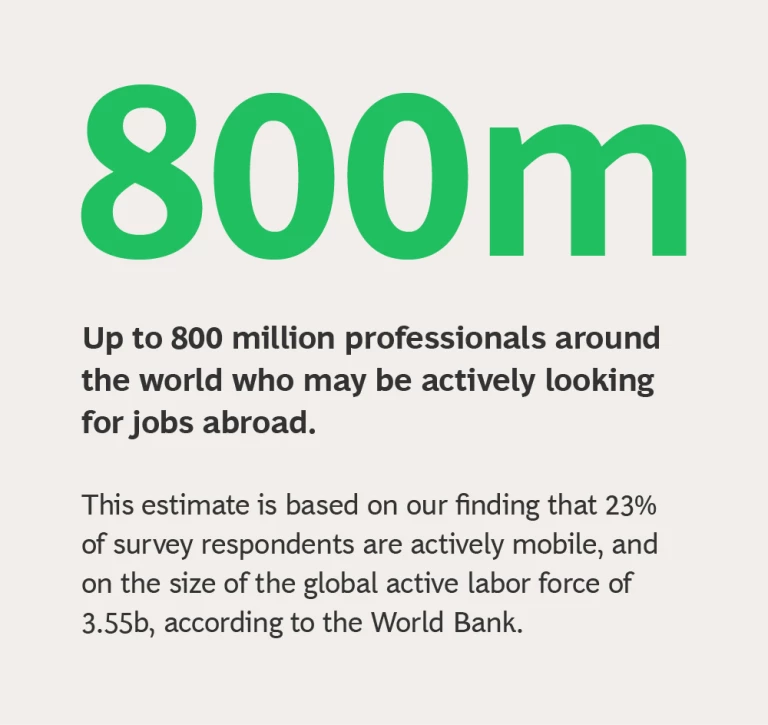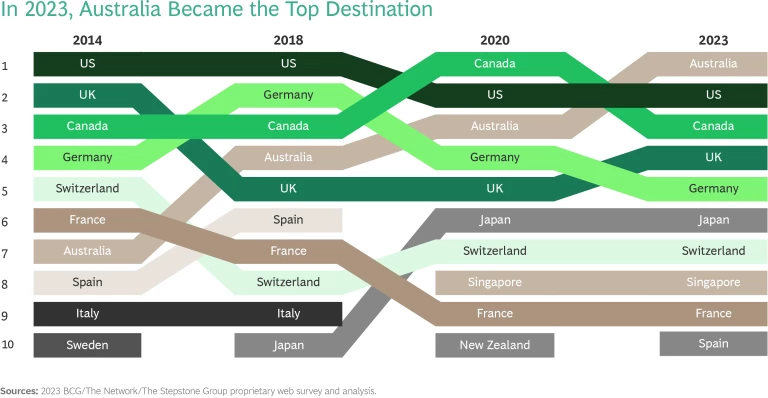This is the first report in a series analyzing the work preferences of global talent in 2024.

Ten years ago, we launched the Decoding Global Talent series of reports, excited to watch trends in the wide world of work. We never imagined how powerfully and rapidly various global forces—the pandemic, remote work, geopolitics, GenAI , and more—would disrupt work. Nevertheless, the turmoil of the past decade has had little impact on the enduring appeal of talent mobility.
Take Anne Granelli. We first interviewed her in 2014, when Anne, a biomedical researcher and native of Sweden, was living and working in New Delhi with her family, after a stint in Canada. “We really like the international atmosphere,” she shared then. “It’s a great opportunity to get different views and learn a lot.” We’ve continued to follow her story. Now 53, she is living and working in Dubai for a US-based medtech company. She recently observed, “Life is too short not to explore all the options.”
The options for working abroad are plentiful—as are the workers who are ready for new opportunities.
Employers and nations stand to benefit as well. But to reap the rewards, they must understand the preferences of mobile workers, which entails answering several key questions:
- How have the top target destinations shifted?
- Why do people aspire to move to specific countries?
- What can future employers and the governments of destination countries do to court global talent?
About the Decoding Global Talent Series
- The Decoding Global Talent series is the largest data source on the mobility preferences of workers globally. Our cumulative data set comprises almost 900,000 responses on where and how people want to work around the world.
- It is a collaboration of BCG, The Network, and The Stepstone Group.
- The current report explores trends in workforce mobility, including willingness to move abroad for work, and provides an updated ranking of top destination counties and cities.
- In this year’s survey, we explored a new dimension of global mobility: the reasons why respondents favor particular destinations. We asked survey participants how they perceive certain countries and why they think they would be happy in those destinations.
Where Do People Want to Go?
In 2023, Australia, which has been steadily rising through the ranks since we initiated this series, finally topped the list of desirable country destinations .

Australia became more attractive to respondents from Asian countries, and it rose in popularity among respondents from North America, Africa, and several European countries, including the UK and Ireland. Amid an economic boom as the world emerged from the worst stages of the pandemic, Australia has been attractive to talent from abroad, offering job opportunities, visas, and great quality of life.
Overall, though, the upper echelon of the rankings hasn’t changed much. Canada and the US are still top-three talent destinations because of the attractive economic opportunities they offer and because they are, simultaneously, English-speaking countries and global melting pots.
The most dramatic change we found in the rankings was Spain’s reemergence among the top ten, after becoming less attractive during the pandemic (the country was hit hard early on).
Why Do People Choose a Specific Country?
We dug deeper to find out how people who are willing to move for work choose a destination, leaning on definitions and rankings from the Organisation for Economic Co-operation and Development in its 2023 Indicators of Talent Attractiveness report.
We looked at extrinsic factors—characteristics of countries. We found that one consistent, primary consideration supersedes individual country brands: the quality of job opportunities. Nevertheless, a few countries benefited from another prominent consideration: quality of life .
And we looked at intrinsic factors—practical considerations related to the individuals themselves. Overall, speaking the primary language or languages of the destination country matters a lot, especially among respondents who favor English-speaking countries. Personal recommendations from acquaintances who have experience with the destination country make a difference, too, as does having a diaspora of the same nationality in the target destination.
What Can Employers and Governments Do?
People’s interest in moving abroad for work is significant, as are the benefits for employers and national and local economies. We recommend that businesses and governments target several key strategic areas and offer mobile talent advice along each step of the journey that they will be taking.
People who have moved abroad for work—or aspire to—do so for a variety of practical reasons. But there’s also a sort of joie de vivre that takes hold among mobile talent. Patrick Byrne, a US-born lawyer now in Spain, shared with us, “I love the idea of adventure. Just the idea of living somewhere else, trying something new, experiencing another culture. That alone is an amazing thing.”
Employers and nations that tap into such positive energy, from the millions of workers with mobile aspirations, will gain a major competitive advantage and source of growth.









